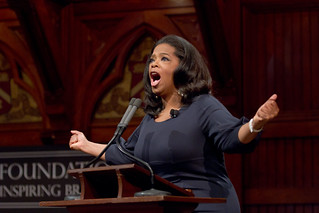Guest Post: On Lance Armstrong
January 22nd, 2013
[I am pleased to present a guest post from my friend Ann Velenchik, professor of economics at Wellesley College, director of their writing program, and expert monologist. This post is reproduced from her private blog, which I am privileged to have access to, in which she has chronicled her experience with her leukemia diagnosis and treatment over the last three years.]
 |
| …one of my idols… “Oprah Winfrey speaks at the launch of the Born This Way Foundation” image by flickr user HarvardEducation. |
January 18, 2013 — Despite living with Bicycle Boy, I take no interest in competitive cycling. We were in Paris for the end of the Tour de France in 2008, and while Tom, Becca and Nate all stood on benches to see the riders circle the Arc de Triomphe, I was happily drinking an orangina at a table far from the crowds. Tom has assured me, for years, that Armstrong has clearly been doping, and I frankly didn’t think much more about it.
But I obviously couldn’t escape the news that Oprah would be interviewing Armstrong on TV last night and, because Oprah is one of my idols, I did a little web surfing this morning to find out what was said. And I found something that made me so angry that I had to respond.
In a part of the conversation about why he had started doping, and how he justified it to himself, Armstrong lay some of the blame on the “fighting spirit” he developed during his “battle” with testicular cancer from October 1996 to February 1997.
“That process turned me into a person — it was truly win at all costs,” Armstrong said. “When I was diagnosed, I said, ‘I will do anything I need to do to survive,’ and that’s good. And I took that attitude, that ruthless and relentless and win-at-all-costs attitude into cycling, and that’s bad.”
Let’s leave aside the fact that there’s evidence that he started doping before he got cancer, and that it’s possible that taking a lot of testosterone might have made that cancer worse. Let’s just talk about the idea that the attitude that helped him “win” the cancer battle justifies, or even explains, what the evidence indicates he has done since.
I think it is highly possible that cancer diagnosis and treatment in the prime of his life was a deep and abiding trauma that warped his moral compass. As I have said before, I don’t think cancer is a blessing in disguise, and I don’t think all the lessons we learn there are good ones, let alone worth the price. So I am not even pissed off that he has the audacity to use his status as a cancer patient to explain the appalling way he has treated people.
What pisses me off is his description of the attitude he brought to treatment itself. When he says “I will do anything I need to do to survive…ruthless and relentless and win-at-all-costs…,” as though lying and cheating and doing terrible things to other people were part of the cancer process, that’s when my head starts to explode.
Because, here’s the thing. There isn’t much in cancer treatment that requires lying or cheating, that requires you to sue for libel the people who are actually telling the truth, or that allows you to threaten and bully and defame other people. Yes, there’s a lot of win-at-all costs to be found there, but those aren’t costs you get to impose on other people.
Lance Armstrong misspoke. Cancer treatment isn’t about being willing to do anything to anyone in order to win. It’s about being willing to endure anything onesself. Here’s my guess. Lance Armstrong is a very bad guy who was a bad guy before he got cancer and perhaps a worse one afterward. He doped because he was getting away with it and getting richer and more famous every minute. He lied and intimidated and threatened and bullied because, as I heard one person say, when he got cornered his strategy was to double down. And maybe his experience as a cancer patient was part of the list of things that made him so broken. But that’s about him, not about cancer.